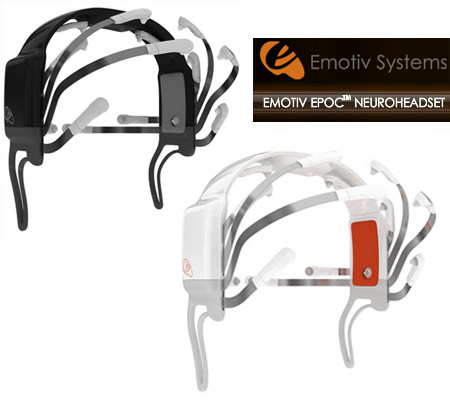
While motion-controlled gaming with systems like the Nintendo Wii are all the rage, new technology heading for consumers this year goes further, sensing facial expressions, emotions and even thoughts.
Focus your mind to cast a magic spell. Smile or wink and your on-screen avatar does the same. Get mellow and background music matches your mood.
These are some of the possibilities promised by Emotiv Systems, which plans to sell its wireless "neuroheadset" late this year.
The 0 device for PCs uses 16 sensors that press lightly against the scalp to monitor electrical activity from the brain and face. A built-in gyroscope tracks head movements to control a cursor or viewing angles.
The brain-sensing technology -- electroencephalography, or EEG -- has been around for decades, mainly as a medical and research tool. Feedback based on EEG has been used by athletes to improve concentration and as therapy for people with attention deficit disorders.
Until recently, it has been too expensive or cumbersome for broad consumer use, said Steve Prentice, a vice president at Gartner Inc., a technology research firm.
Wearing the equipment with its wires and electrodes, "you ended up looking a bit like a laboratory rat," he said. "What Emotiv appears to have done is bring that laboratory environment out into the real world."
Prentice said brain-computer interface technology has many applications, but Emotiv is smart to start with the video game market.
"In gaming, people are looking for any additional sort of edge or cool technological advantage," he said. "It’s a short move from gaming to things like virtual worlds and from there into the mainstream computing environment."
Emotiv has already piqued the interest of IBM Corp., which is testing how the headset, called EPOC, may work with virtual environments.
"As interactions in the virtual world are becoming more complex, mouse and keyboard alone could soon not be enough," IBM spokesman Steven Tomasco said.
He said Armonk, N.Y.-based IBM has no business partnership with Emotiv, but sees the headset as "a very exciting development in human-machine interface."
Others also see the potential of mind over mouse.
OCZ Technology Group Inc. began offering its Neural Impulse Actuator for gamers this year. The device, selling for about 0, is a headband with three sensors that rest on the forehead, detecting electrical signals from movements like a furrowed brow or a blinking eye to control on-screen action in PC games.
NeuroSky Inc. makes "bio-sensors" for consumer products, including toys, and earlier this year demonstrated a prototype headset with gaming applications that detects brain waves and tracks head and eye movement.
These interfaces are among a host of new technologies seeking to enhance or displace the traditional mouse, keyboard and joystick.
Vibration feedback and motion sensing are increasingly common in mobile devices and, led by the Nintendo Wii, in game systems.


No comments:
Post a Comment